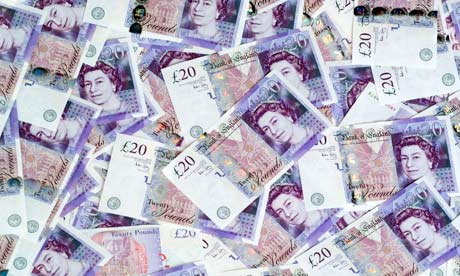http://www.myspace.com/dhlxstudios

The greatest privatisation in history has gone unnoticed. It's time to take from the banks the power to produce money

Rich pickings: but only a fraction of the world's money is physical. Photograph: Paul Rapson/Alamy
It's common knowledge that printing your own £10 notes at home is frowned upon by Her Majesty's police. Yet there's a small collection of companies that are authorised to create – and spend – more new money than the counterfeiters have ever been able to print. In industry jargon, these companies are called "monetary and financial institutions", but you probably know them by their street name: "banks".
The money that they create, effectively out of nothing, isn't the paper money that bears the logo of the government-owned Bank of England. It's the electronic money that flashes up on the screen when you check your balance at an ATM. Right now, this electronic money makes up over 97% of all the money in the economy. Only 3% of money is still in that old-fashioned form of real cash that can be touched.
Hard to believe, isn't it? Martin Wolf, one of the experts who sat on the independent commission on banking, put it bluntly, saying in the Financial Times that "the essence of the contemporary monetary system was the creation of money, out of nothing, by private banks' often foolish lending".
Here's how it works. When you ask the bank for the money to buy a one-bedroom box in London, the money that appears in your account isn't borrowed from some prudent grandmother's life savings. In fact, the bank simply types those numbers into your account, creating brand new money that you can now spend. As other banks do exactly the same, the amount of money in the economy grows and grows. Every new mortgage creates new money, which pushes up house prices just a little more and forces the next buyer to borrow even more from the banks. (A more detailed and fully-referenced explanation of this process is given in the book Where Does Money Come From? published by the New Economics Foundation.)
Through this process of creating money, banks have been able to inflate the money supply at a rate of 11.5% a year, pushing up the prices of houses and pricing out an entire generation.
Of course, the flipside to this creation of money is that with every new loan comes a new debt. This is the source of our mountain of personal debt – not money that had been prudently saved up by pensioners, but money that was created out of nothing by banks and lent to anyone and everyone. Eventually the debt burden becomes just too high, and we see the wave of defaults that triggered the start of the ongoing financial crisis.
But how did something as important as money become privatised? How did the power to create money fall into the hands of the same banks who caused the crisis, with such devastating consequences for millions of ordinary people?
Incredibly, the law that makes it illegal to print your own tenners at home has never been updated to apply to the electronic money that is now created by banks. As we began to use electronic money to make the vast majority of payments, cash became less important and the power to create money shifted to the banks that caused the crisis. Without anyone noticing, the power to create money was privatised by stealth.
So while criminal gangs manage to create about £2.5bn of fake cash each year, the banks collectively create more than £100bn a year without breaking a single law. Their reward for doing so is the interest that is currently being collected on nearly every pound in existence. The cost to the rest of us is a lifetime in debt.
This brings us to a very simple solution to the financial crisis. Many of the current protesters might be surprised to hear that the answer to our current crisis comes from a former Tory prime minister. Back in 1844, Sir Robert Peel realised that metal coins, which at that time were the only legal form of money, had been superseded by new paper notes issued by banks. These paper notes were lighter and more convenient, and therefore much more popular. Peel's 1844 Bank Charter Act took the power to create paper money away from the banks and placed it back under control of the Bank of England. We should now do exactly the same with the power to create electronic money. My own organisation, Positive Money, has even drafted the legislation that would be required to do this.
By reclaiming this power, we can ensure that new money is not used to blow up house price bubbles and fund risky speculation. Instead, newly created money can be put in at the roots of the economy, through ordinary consumers. It will then end up with shops, businesses and factories, who can use it to invest, grow and create jobs. Simply "getting banks lending again" won't help when the public are already saddled under a mountain of debt. What we need is more money, not more debt. This is impossible while all money is created by banks when people go into debt.
Of course, we need to shelter this power to create money from vote-seeking politicians. But the power to create money is far too dangerous to leave in the hands of the banks who caused the crisis. Taking this power away from them is our best hope of both ending the current crisis, and preventing the next one.
The money that they create, effectively out of nothing, isn't the paper money that bears the logo of the government-owned Bank of England. It's the electronic money that flashes up on the screen when you check your balance at an ATM. Right now, this electronic money makes up over 97% of all the money in the economy. Only 3% of money is still in that old-fashioned form of real cash that can be touched.
Hard to believe, isn't it? Martin Wolf, one of the experts who sat on the independent commission on banking, put it bluntly, saying in the Financial Times that "the essence of the contemporary monetary system was the creation of money, out of nothing, by private banks' often foolish lending".
Here's how it works. When you ask the bank for the money to buy a one-bedroom box in London, the money that appears in your account isn't borrowed from some prudent grandmother's life savings. In fact, the bank simply types those numbers into your account, creating brand new money that you can now spend. As other banks do exactly the same, the amount of money in the economy grows and grows. Every new mortgage creates new money, which pushes up house prices just a little more and forces the next buyer to borrow even more from the banks. (A more detailed and fully-referenced explanation of this process is given in the book Where Does Money Come From? published by the New Economics Foundation.)
Through this process of creating money, banks have been able to inflate the money supply at a rate of 11.5% a year, pushing up the prices of houses and pricing out an entire generation.
Of course, the flipside to this creation of money is that with every new loan comes a new debt. This is the source of our mountain of personal debt – not money that had been prudently saved up by pensioners, but money that was created out of nothing by banks and lent to anyone and everyone. Eventually the debt burden becomes just too high, and we see the wave of defaults that triggered the start of the ongoing financial crisis.
But how did something as important as money become privatised? How did the power to create money fall into the hands of the same banks who caused the crisis, with such devastating consequences for millions of ordinary people?
Incredibly, the law that makes it illegal to print your own tenners at home has never been updated to apply to the electronic money that is now created by banks. As we began to use electronic money to make the vast majority of payments, cash became less important and the power to create money shifted to the banks that caused the crisis. Without anyone noticing, the power to create money was privatised by stealth.
So while criminal gangs manage to create about £2.5bn of fake cash each year, the banks collectively create more than £100bn a year without breaking a single law. Their reward for doing so is the interest that is currently being collected on nearly every pound in existence. The cost to the rest of us is a lifetime in debt.
This brings us to a very simple solution to the financial crisis. Many of the current protesters might be surprised to hear that the answer to our current crisis comes from a former Tory prime minister. Back in 1844, Sir Robert Peel realised that metal coins, which at that time were the only legal form of money, had been superseded by new paper notes issued by banks. These paper notes were lighter and more convenient, and therefore much more popular. Peel's 1844 Bank Charter Act took the power to create paper money away from the banks and placed it back under control of the Bank of England. We should now do exactly the same with the power to create electronic money. My own organisation, Positive Money, has even drafted the legislation that would be required to do this.
By reclaiming this power, we can ensure that new money is not used to blow up house price bubbles and fund risky speculation. Instead, newly created money can be put in at the roots of the economy, through ordinary consumers. It will then end up with shops, businesses and factories, who can use it to invest, grow and create jobs. Simply "getting banks lending again" won't help when the public are already saddled under a mountain of debt. What we need is more money, not more debt. This is impossible while all money is created by banks when people go into debt.
Of course, we need to shelter this power to create money from vote-seeking politicians. But the power to create money is far too dangerous to leave in the hands of the banks who caused the crisis. Taking this power away from them is our best hope of both ending the current crisis, and preventing the next one.


No comments:
Post a Comment